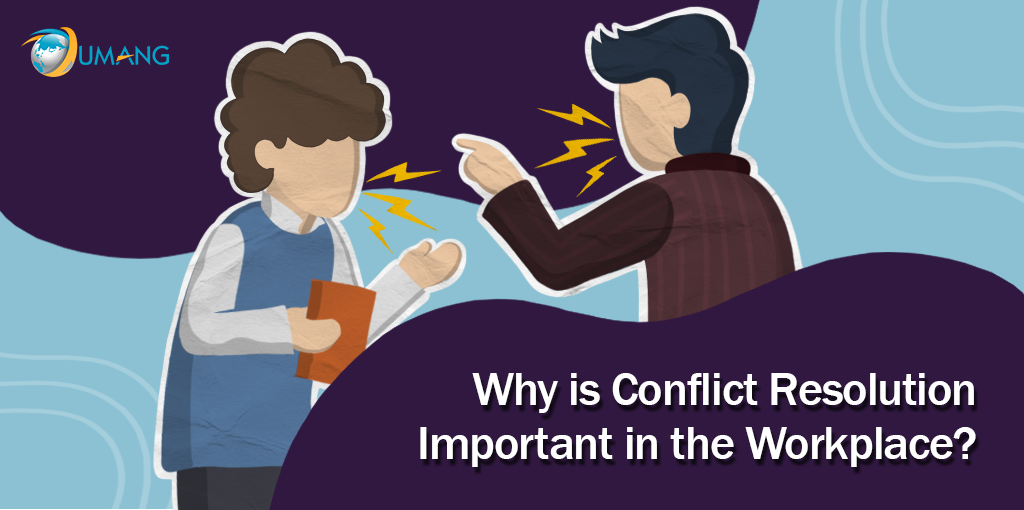Almost every workplace has some form of conflict, which when left unaddressed often leads to a pessimistic ambiance. The work culture is impacted severely and employees are left sulking and dissatisfied with the methodologies followed for managing and controlling internal and external factors. On top of this, productivity and efficiency deteriorate by a whopping value at both team and individual levels, causing the entire organization to take the fall.
That’s why it has become a top priority for all professionals to handle conflicts smartly, calmly, and patiently with a radical and unbiased approach. When people with different backgrounds, opinions, and skills work together, conflicts are bound to arise. So, understanding the importance of conflict resolution for the greater good is imperative.

Prevents Work Disruptions
From work-style related conflicts to issues with discriminative ideologies at higher levels, several factors contribute to work disruptions. For instance, when a team is dissatisfied with the leader’s work style or a few individuals encounter bias from the managerial level, it compels them to stop the ongoing work then and there. As a result, the overall deliverability is hampered and productivity starts spiraling down. To prevent such disruptions from happening at the workplace, managers, and tower leads must focus on conflict resolution at the earliest.
Promotes Optimistic And Unbiased Culture
Several studies have already proven how negativity can spread like wildfire within a workplace and create unimaginable destruction. Employees find it difficult to thrive in such ambiance and their efficiency automatically takes the fall. Also, employees start to detach themselves from the workplace, avoid taking accountability, and participate in any social or work-related event. Fostering such a pessimistic work culture never brings any fortune to the organization. That’s why managers and HR professionals thrive hard to implement radical approaches to conflict resolution and promote an optimistic and unbiased work culture. Once the conflicts are resolved with a win-win situation, both parties become satisfied and employees can work in a lighter and peaceful environment.
Enhances Employee Retention And Engagement
When the workplace is filled with various types of conflicts, like task-based conflicts, leadership conflicts, and so on, it becomes increasingly difficult for the organization to retain and sustain employees for a long time. In fact, conflicts are one of the many reasons for mass resignations at several organizations. This not only impacts the resource availability and management of the organization but also delays deliverability, reduces efficiency and productivity, and makes a negative impact on the brand value. Owing to this, team leads, managers, and stakeholders try hard to reach the same ground and resolve even the smallest conflict before it takes a bad shape. As conflicts get resolved, employees feel safer and motivated to work without worrying about their rights and peace. This automatically boosts employee retention and engagement rates within the organization at all levels.
Fosters Innovation And Creativity
Another major reason to prioritize conflict resolution in workplaces is to foster creativity and innovation. When employees feel biased or aren’t allowed to express their judgments or share opinions out loud, they feel dejected and unmotivated. Furthermore, when they are left out of important discussions concerning projects, company policies, or anything like this, they do not find any reason to work hard for the organization’s betterment. This automatically impacts the overall development and in this hypercompetitive market, such conditions can prove to be the doom of the organization. Owing to this, managers and tower leads thrive hard to resolve leadership, task-based, personality-based, and other types of conflicts at the earliest before they take a bad shape. With no such conflicts, employees feel enthusiastic to share their views and opinions, thereby paving way for introducing innovation and creativity within the workplace.
Increases Project Success Rate
Lastly, conflicts can lead to reduced project success, especially if there are multiple unattended conflicts within the teams or at individual level. The overall deliverability is impacted severely and the outcomes are not at all at par with the expectations. This can also hamper the organization’s relation with the client and its brand image. Due to this, managers have to work on resolving the conflicts at the earliest before they delay project deliverability and lead to failure.
Conclusion
Conflicts are inevitable at workplaces and they are not something one can manage overnight. Certain conflicts get resolved via simple negotiations or one-on-one discussions while others might require problem analysis and extensive planning. Regardless of what it is, letting a conflicting situation to thrive within the workplace can create numerous problems for the organization. That’s why resolving them at the earliest with a radical and unbiased approach is a must.